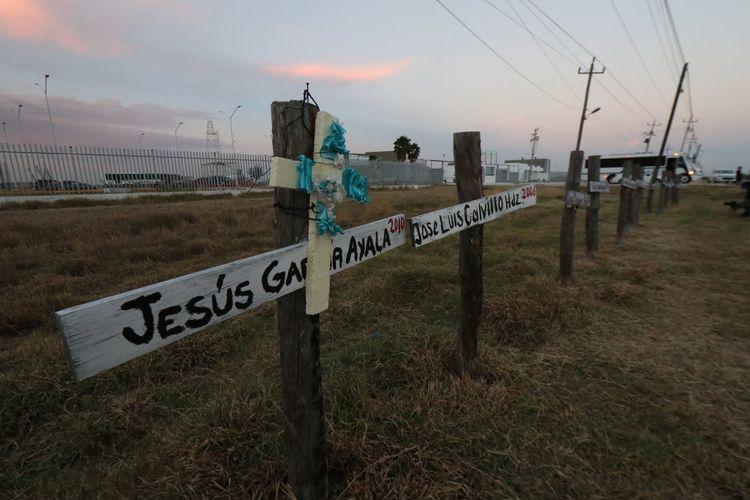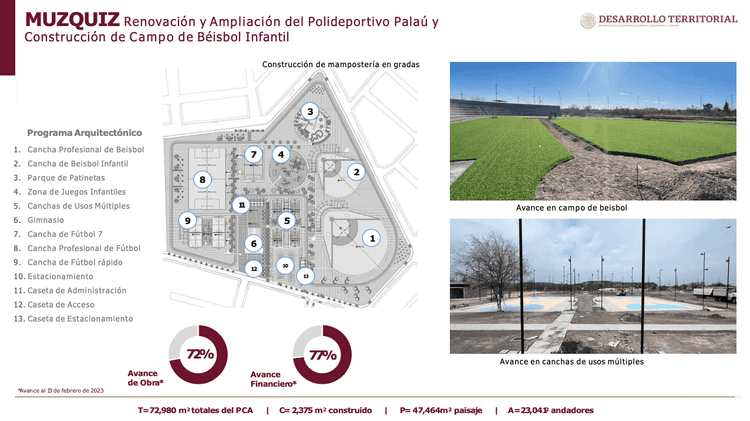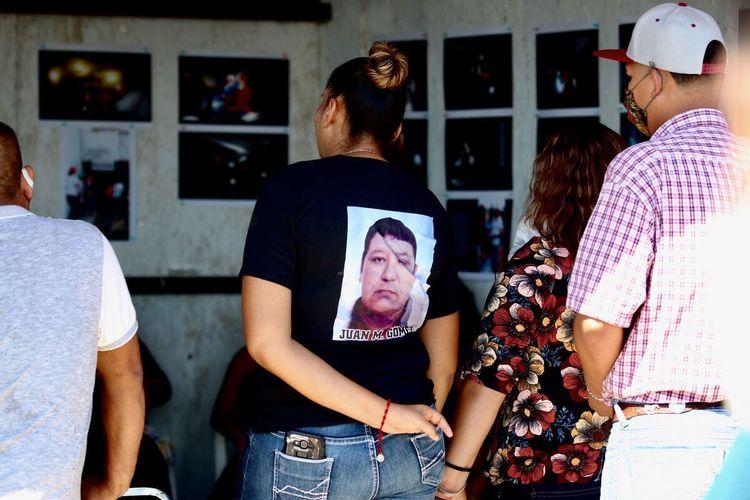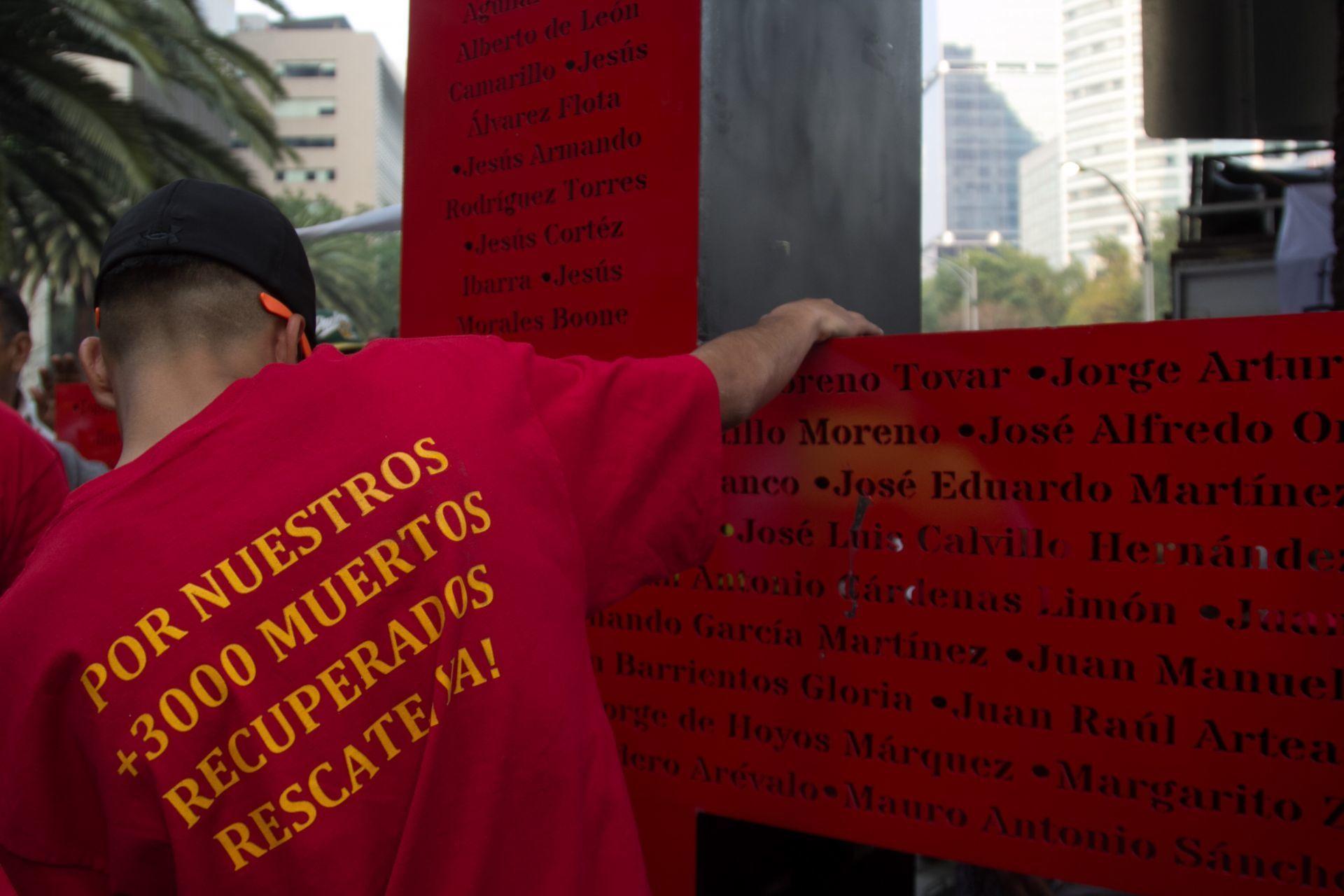At the Pasta de Conchos coal mine, municipality of San Juan de Sabinas, Coahuila, the transformers stopped working hours before. The previous days, there were complaints from miners about an accumulation of gases that went unaddressed. Even so, they finished their shift around dawn and crossed paths with their teammates who were entering the next day. There were 65 of them who never came out again.
17 years after that explosion in the early morning of February 19, 2006 at the Pasta de Conchos mine, belonging to Grupo México, the rescue of the remains has not been completed. And less than a year after the end of President Andrés Manuel López Obrador's six-year term, the plan run by the Federal Electricity Commission (CFE) is still delayed, according to information reported by family members.
A plan that includes repair measures such as the renovation of sports cars or the construction of a baseball park instead of the measures requested by families, such as the renewal of equipment and the supply of medicines at the clinic of the Mexican Social Security Institute (IMSS) 24 in Nueva Rosita corresponding to the municipality.
The 2006 disaster was followed by the collapse at the Lulu mine in Múzquiz, municipality of Escobedo, which left two dead in 2009 in the same region; the explosion at Well 3 of BINSA in Sabinas, where 14 miners died in 2011; the death of 10 miners buried in the El Pinabete coal well, also located in Sabinas, on August 3, 2022; and the accident on a conveyor at the El Mezquite mine, located in the same municipality, which left two workers dead last July.
In addition, the organization Familia Pasta de Conchos has reported over the years everything from floods to explosions in mines in the so-called coal region that includes the municipalities of Juárez, Melchor Múzquiz, Progreso, Sabinas and San Juan de Sabinas, in northern Mexico.

Pasta de Conchos during the visit of President Andrés Manuel López Obrador in October 2020. Photo: Alejandro Rodríguez/Cuartoscuro.com
A plan without progress
Omar Ballesteros is the son of a father, grandfather and great-grandfather miners. Ever since he was a child, he heard that in his town of Barroterán, located in the coal region of Coahuila, dedicating himself to mining was a source of pride. A job that you could give your life for.
“There were always accidents or deaths of miners. I saw how my friends were left without a cousin, without a dad, without a family member and that was normal. They made us believe that the deaths were something that had to happen because it's natural for mines to explode. It was never explained to us that security measures were actually needed,” he recalls.
Omar grew up with stories of mining disasters. From backgrounds such as the Guadalupe mines that exploded on March 31, 1969 and killed 153 workers, to the Pasta de Conchos disaster. The reality motivated him to join the organization of families seeking justice for their deceased.
“The inhabitants' perspective has changed a bit. Previously, the organization talked about closing a mine because of the terrible working conditions and the inhabitants answered no, that how dare they want to close their source of employment. Now those same inhabitants are beginning to demand that those responsible be punished, that what happens in the mines be resolved. Yes, we have had a change in mentality,” says Omar Ballesteros.
According to the Miguel Agustín Pro Juárez Human Rights Center (Centro Prodh), mine 8 of the Pasta de Conchos unit had reports of security failures since 2000. In the last inspection, carried out on July 12, 2004, 43 violations of the safety and hygiene standard were found and 48 measures were ordered, several of which were extremely urgent, which were omitted by the authorities.
After the explosion in the early morning of February 19, 2006, Grupo México began rescue efforts in Pasta de Conchos, managing only to recover the bodies of Felipe de Jesús Torres Reyna and Manuel Peña Saucedo. Almost a year later, on April 4, 2007, the company decided to suspend its work on the grounds that rescuers were at risk.
He also said that the miners had burned to death, although the autopsy of the two rescued men indicated that the cause was asphyxiation. To date, there have been no sanctions or arrests against those responsible. In 2012, with the six-year term of President Enrique Peña Nieto, there was no continuity, and the then Federal Attorney's Office (PGR) closed the investigation in favor of the version given by Grupo México.
The families brought the case to the Inter-American Commission on Human Rights (IACHR) in 2010. And it was until 2018, with the admissibility report No.12/18 Petition 178-10, that it was noted that the causes of the explosion, the recovery of the bodies or the alleged responsibility of public servants have not been determined. A process that should be promoted by the State.
Therefore, in 2019, the current president, Andrés Manuel López Obrador, announced that he would adhere to those established internationally. And it was with this that in 2020, the Comprehensive Plan for Reparation and Justice in Pasta de Conchos emerged, which consists of compensation for the bereaved, provision of housing, urban improvement measures, construction of a memorial and, mainly, the rescue of the remains of deceased miners.

Renovation of the Palaú sports center and construction of a children's baseball field as part of the Comprehensive Plan for Reparation and Justice in Pasta de Conchos.
Baseball parks as remediation
The rescue this time, led by the CFE, began in 2021 with the objective of reaching the point where the deceased could be found by the first quarter of 2024.
Grupo México no longer participates in these tasks. The company's last statement was in 2020, stating that the concession title for the Pasta de Conchos mine and its facilities would be awarded. This is in response to President López Obrador's request that federal institutions could dispose of the site and resume rescue work.
“For us it was very disconcerting that the president decided that CFE was in charge of the rescue in Pasta de Conchos. And our opposition is because (CFE) has no coal mines or experience in mining rescue and proof of that is that the work is a disaster,” says Cristina Auerbach, president of the organization Familia Pasta de Conchos.
Last May, Luisa María Alcalde, Secretary of Labor and Social Welfare (STPS), reported that excavation had restarted on the access and ventilation ramps by the company Obras Mineras y Tiros del Centro S.A. de C.V, under the supervision of the CFE. The works had been slowed down due to problems with workers from the previous company where problems with non-payments and security measures were publicized in the media.
So far, the works are barely a quarter of them. The access ramp has an extension of 22% and the ventilation ramp is 23%, which for Pasta de Conchos family members is a disappointing picture. In addition to this, there are omissions and demands such as access to justice, the punishment of those responsible and measures of non-repetition.
“It remains implicit that the right to the truth be postponed. Families still don't know how they died and what really happened because the rescue isn't progressing. Even in the document that was written on the reparation of the damage, there is no question of justice, the company has not been called to account and it is very disconcerting that the State assumed all responsibility,” says Cristina Auerbach.
Regarding other measures of the Comprehensive Plan for Reparation and Justice in Pasta de Conchos, such as compensation, the government has reported three works in the municipalities of Múzquiz and San Juan Sabinas. The first is the renovation and expansion of the Palaú Sports Center and the construction of a children's baseball field; the renovation of the Plaza Central de Nueva Rosita; and the renovation of a sports module in the town.
“The families were asking that this money be invested in the IMSS clinic that corresponds to this region because there are no pulmonologists, there are no incubators and, like all Social Security clinics, they have a shortage of medicines. And no, they decided to build baseball parks, there's even a park they're building in a town (Palaú) where there are no affected families,” explains Cristina Auerbach.
In addition, the construction of the Memorial for victims was intended to be carried out without having finished the rescue. Therefore, family members were opposed to continuing these works.

Family members of Pasta de Conchos during the visit of President Andrés Manuel López Obrador in October 2020. Photo: Alejandro Rodríguez/Cuartoscuro.com
Repair the damage
The disasters in the coal mining region of Coahuila have not only impacted the way of thinking of its inhabitants. Also, fewer and fewer young people are going to the mines to work, as is the case of Omar Ballesteros.
“For a long time it was presumed that being a miner is the best thing because not just anyone can enter there. There was a certain machismo in the coal miners and it's understandable because that's how we were educated through the businessmen's narrative of mining pride. In my case, I didn't want to (dedicate myself to this), but I also knew that there were no other sources of employment here,” says Omar.
So he decided to work for the second job option in the region: the maquiladora. Remember that at the time, his schoolmates told him that they didn't want to go to the maquiloras because they were for women and that courage will be demonstrated in the mines. But despite the comments, the young man decided to work for three years to raise enough money to allow him to travel to Mexico City to take film courses.
“It's not simple. I'm telling you that I quit the maquiladores in 2018, then I went to Mexico City, went back to the maquiloras again, then I came back. So coming and going, coming and going, it's very ugly to detach myself from the earth, to detach myself from my family so I can go and seek other horizons because all there is here is death and labor exploitation,” says Omar Ballesteros, who is currently studying Communication thanks to a scholarship he won at the Western Institute of Technology and Higher Education (ITESO).
However, the organization Familia Pasta de Conchos, to which Omar is still a member, has been able to document how working conditions for miners are still unsafe. Among the list of cases that have been seen are outsourcing contracts, lack of social security, no emergency exits inside mines or basic services such as access to drinking water.
“Often they don't even have specialized uniforms, in other words, it seems that being a miner means just having a helmet, boots and a lamp that half works so you can work,” said Omar Ballesteros.
On the other hand, there are also impacts on the environment. According to the study Perspectives of the Coahuila Coahuila Coahuila by WWF Mexico, the use of coal to generate electricity has impacts on the formation of acid rain, on the toxicity of aquatic systems and on air quality, which affects human health, mainly the respiratory and cardiovascular systems.
The Laguna Observatory has documented that in Coahuila the main disease affecting the population is respiratory tract infection.
“There is no will on the part of businessmen to change things or political will on the part of the State to do things so that miners don't have to leave their lives there. Because there are those who die, but there are also all the mutilated, all the sick, who walk in villages with wheelchairs, with oxygen tanks, like souls in pain with pensions of a thousand pesos a month,” said Cristina Auerbach, president of the organization Familia Pasta de Conchos.
To this, Omar adds that for there to really be a transition that will improve the conditions of the coal region, whose main source of income is still mines and wells. It maintains that there must be support from all relevant authorities and organizations.
“We judge that mining is bad because it has left death and pollution, but we don't see that it is also a source of jobs because if it is closed, there is no one to accompany its inhabitants. All the political candidates say they are going to diversify the economy, but that has not been seen in the course of any administration,” concludes Omar.



Comentarios (0)